Many people don’t include information about water in their information about keeping chickens – because it is, well, just water isn’t it? Well, in fact there is much to be said about drinking water for chickens and it is absolutely essential for their well being.
Here are the main things you need to know about water:
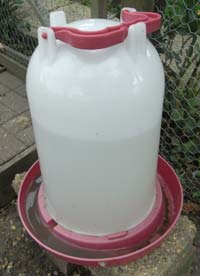
Dirty Water or Bacteria Soup?
Water needs to be fresh: if you leave it in the container for a few days at a time, it will start to go stagnant and turn green.
Now I hear you say that chickens can drink out of a muddy puddle and it does them no harm? That water is usually fresh rain water and the mud will certainly not harm them – but water kept in plastic containers that has turned green should be thought of as “bacteria soup” because it’s full of bacteria that can harm them.
Green drinking water is a sure way to be asking for trouble with diseases and should be avoided.
Changing their water daily or every-other day is easy enough and if you rinse the container out, you can use a small washing up brush around the lip and inside to remove any build-up of anything nasty.
A chicken’s body is constantly challenged by bacteria that cause diseases in their environment. Their body will build up an immunity (known as acquired immunity), however giving them large doses of “bacteria soup” will risk them becoming ill so please change water daily or at least every other day!
When you change their water, watch them rush over and take a drink – they do appreciate clean drinking water!
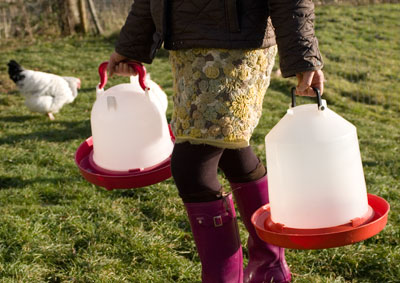 Water needs to be kept in the shade during very hot weather: Chickens can handle the cold very well, they fluff up their feathers to trap air which insulates their body, however they can’t handle the heat very well. Chickens can’t sweat, they can only pant to lose heat through the air they breathe out and drink water to cool themselves down. During very hot weather, it is best to place their (fresh!) water in a shaded position (and after reading about shelter for chickens under the ‘Getting Started’ menu, you will of course be providing them with adequate shade).
Water needs to be kept in the shade during very hot weather: Chickens can handle the cold very well, they fluff up their feathers to trap air which insulates their body, however they can’t handle the heat very well. Chickens can’t sweat, they can only pant to lose heat through the air they breathe out and drink water to cool themselves down. During very hot weather, it is best to place their (fresh!) water in a shaded position (and after reading about shelter for chickens under the ‘Getting Started’ menu, you will of course be providing them with adequate shade).
Water containers left in the sunlight can soon heat up the water inside to a high temperature which means chickens can’t lose as much heat by drinking so please, keep their water in the shade during hot weather and if you can, give them some fresh, cool water when it’s hot.
Water containers
Water containers for chickens come in a variety of shapes and sizes to suit your needs. Some are galvanised and will last a very long time but the majority are plastic.
Galvanised Containers:
- Last a life time, withstands Knocks
- Withstands frost
- Cannot be used to give Apple Cider Vinegar since the acid corrodes the galvanising
- Doesn’t show you how much is left in the container.
Plastic Containers:
- Can be used to give Apple Cider Vinegar in the water
- Shows you how much water is left
- Will only last a couple of years – bases crack, locking bits snap off or handles break, colours fade in the sun.
- Will crack if you drop or knock it when full.
There is a full range of water containers for sale on this page at Amazon.

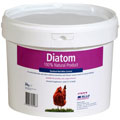
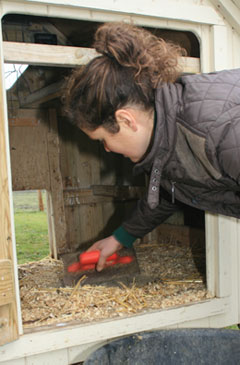
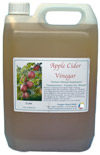


Hi, Could you please tell me what the apple cider vinegar does for free range chickens?
Thanks Steve
Please read my page (or the page on poultrykeeper.com) about Apple Cider Vinegar – this should help.
I obtained some hens from the welfare trust in mid may 2014. I cannot see any sign of worms but should i be proactive and start giving worm treatment, or wait until I find evidence of worms, thank you.
In an ideal world, we would send off samples for testing the worm egg count and only worm when necessary but unless you are a commercial farmer, the expense isn’t usually warranted for a small flock.
So as hobby keepers we normally worm every 3 months when birds are on the same ground or some worm every 6 months if their birds are on a larger area or have different ground that they can be moved onto regularly.
How much apple cider vinegar should I add to my chickens water. I have an automatic water system but from this heat it still gets green
The dilution rate is usually on the pack – about 20ml per litre (2%).
It’s herbal though so it’s not critical – I usually put in a splash without measuring it!
Ive given my chickens worming meds thats in their pelletts, told its done yearly, having checked all the above, its been said 3 or 6 monthly. What should i do ?
Hi Emma,
Well really you only need to worm chickens if they have worms… generally poultry keepers have wormed in spring as the temperature warms up and in the autumn, after the moult but if the chickens are kept in confined spaces or on ground that has been heavily used by chickens then you might need to worm more regularly.
I’ve changed my view a little since originally writing this page (and have recently made some updates) – there are now postal worm testing kits available that allow you to test for worms periodically. Previously you would have had to go to a vet and the cost was maybe £40-£50 so people just wormed their birds, but now we can test a flock for a reasonable price before using a wormer.
As has happened with sheep, worms develop resistance to wormers over time so it’s a much better approach, only worming if really necessary.
Is it alright to give water from a water butt or fresh water from the tap?
Providing the water isn’t stagnant, it should be fine.